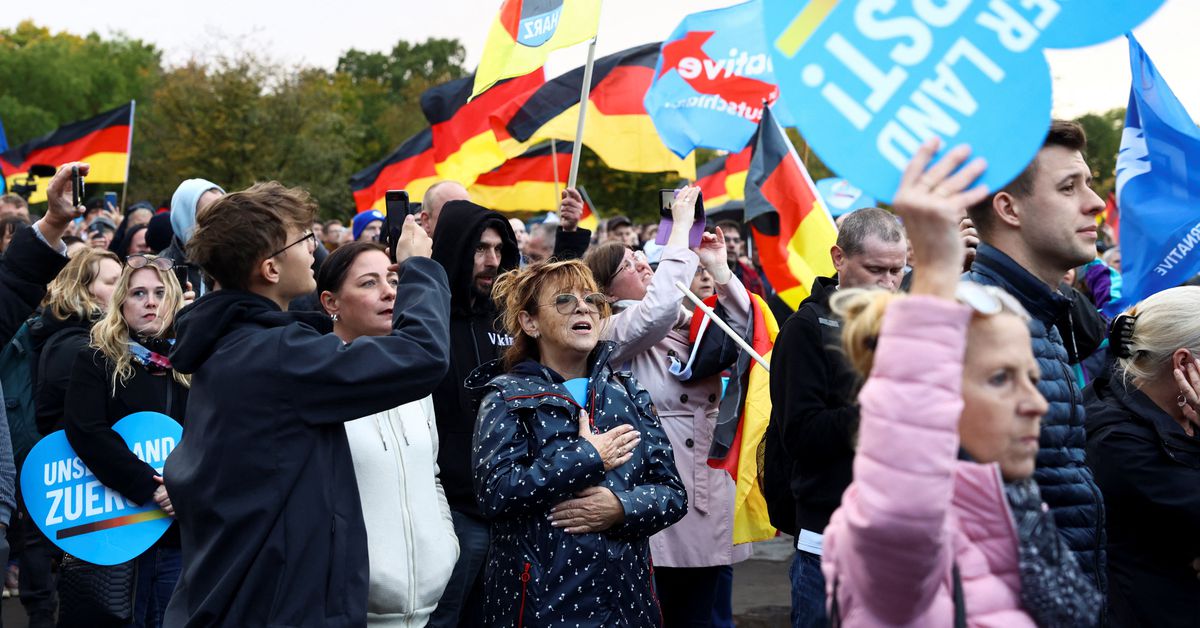BERLIN, June 25 (Reuters) - A far-right Alternative for Germany (AfD) candidate won a vote on Sunday to become a district leader in Europe’s biggest economy for the first time, a breakthrough for the party which has hit record highs in national polls.
The 10-year old AfD, with which Germany’s mainstream parties officially refuse to cooperate due to its radical views, won a run-off vote in the Sonneberg district in the eastern state of Thuringia with its candidate garnering 52.8% of the vote.
It is the latest success for the party which is riding a wave of popular discontent with Social Democrat Chancellor Olaf Scholz’s awkward coalition with the Greens and Free Democrats (FDP) which is dogged by infighting over policy and the budget.
Polling at 19%-20%, behind the opposition conservatives, the AfD is tapping into voter fears about recession, migration and the green transition, say analysts. It even plans to nominate a chancellor candidate in the 2025 federal election.
While far-right parties have gained ground around Europe, the strength of the AfD is particularly sensitive in Germany due to the country’s Nazi past.
The President of the Central Council of Jews in Germany, Josef Schuster, expressed deep shock.
“This is a watershed that this country’s democratic political forces cannot simply accept,” he told RND media.
Particularly strong in the former Communist East, polls suggest the party may win three eastern state votes next year.
A clear victory for the AfD’s Robert Sesselmann in the district, which has a population of only around 56,000 people, sends a signal to Berlin, say analysts, especially as all other parties in Sonneberg joined forces in a front against him.
Sesselmann was forced into a run-off against a conservative candidate after a vote two weeks ago. The conservative candidate won 47.2% on Sunday.
The party opposes economic sanctions against Moscow over the Ukraine war and disputes that human activity is a cause of climate change.
The domestic intelligence agency said this month that far-right extremism posed the biggest threat to democracy in Germany and warned voters about backing the AfD.
Formed a decade ago as an anti-euro party, its popularity surged after the 2015 migrant crisis and it entered parliament in 2017, becoming the official opposition. Reporting by Madeline Chambers; Editing by Chizu Nomiyama



As the article states, the National Government has gone further left in recent years (CDU has been replaced by a coalition between SPD and the Green Party), but the fact that AfD (which is basically a neo-nazi party) has won a district suggests that the right is unhappy with the government becoming more progressive, and they’re opting towards far-right extremism.
This is dangerous, and antifacist action is needed to prevent the facism from spreading.
I feel extremely silly asking this question, but I am truly curious: Isn’t Nazism illegal in Germany? And if so, why exactly hasn’t AfD been banned yet? Like, is it a matter of them carefully using plausible deniability, dogwhistles and skirting JUST enough beyond the laws currently to not be labeled Nazis?
Yes, it’s exactly that. They also tap into the “rust-belt” decay along with the sense of economic nihilism of former GDR eastern states(Especially in Thuringia, Saxony). They started specifically as a right-wing Eurosceptic party during the time I was living in Germany in 2013. Even then, it was clear they were attracting some of the more dangerous far-right factions that has been “shut out” of the political system in Germany due to how the voting system works.
They very much toe the line, however, the party has gotten more extreme over the years, especially those in Saxony and Thuringia. People like Hocke does get charged for violating anti-nazism rules, but somehow is still quite influential in the AfD as they have failed to oust him in the past. https://en.wikipedia.org/wiki/Björn_Höcke
The AFD’s original goal was to get rid of the Euro and revert back to Germany’s old currency, the Deutsche Mark. The party was more dumb-conservative in the past but since it gained traction, it became more of a right wing extremist party. They’re mostly avoiding breaking any laws which is why the party still exists.
That being said, they’re already being investigated on the basis of violating the constitution and they might be outlawed at one point.
I am wondering about that too…
The German government has been keeping a close eye on its members, especially more extreme members to ensure they “aren’t interacting” with openly neo-nazi organizations. Even the most extreme members find ways to skirt the line, avoiding openly meeting with Nazis. Then there’s moderates who are covert racist but focus on making their party’s core racist, bigoted policies seem like common sense policies to make Germany better. Then you have least extreme members who buy into the racist policies but are ignorant about how racist the policies really are and buy into the moderate propaganda. A lot of these least extreme members denounce extremists, wishing they could expel them from the party and worrying about them overtaking the party, and wringing their hands. Very similar to how the US Republican party works.
The party is on a watchlist of the Verfassungsschutz, it is a possibility to ban a party but it ain’t easy and a failed attempt would look horrible.
Very valid question. They blow a lot of dogwhistles.
The NSDAP is the exact reason as to WHY it is so hard to ban political parties in Germany. The AfD is actually pretty close to getting banned but it’s a process, and if it happens you can expect a lot of people to be unhappy about it as well.